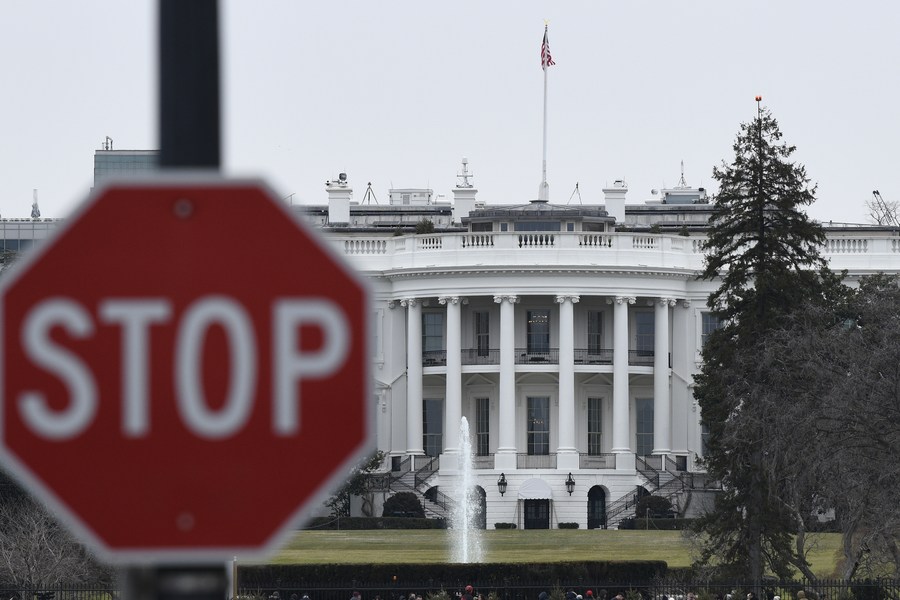Who's actually running the war-enthusiastic United States?
Xinhua | Updated: 2023-04-14 08:56

The United States is either waging war abroad or on the road to doing so, which has left hundreds of thousands of people dead and tens of millions displaced. So, who is profiting most from the endless wars waged by the United States? The answer is quite straightforward: the US military-industrial complex.
For decades, the complex, formed by the military, defense contractors, and politicians, has continuously provoked conflicts and created wars around the world, causing a countless destruction of families and bringing about serious humanitarian disasters. The US war machine and the military-industrial complex are actually running America, said experts.
A PROMOTER OF ENDLESS WAR
The US military-industrial complex has pushed "wars for their own profit motives," paying no attention to the consequences of wars because as long as arms manufacturers sell weapons, "they're happy with that," Daniel Kovalik, an American lawyer who teaches international human rights at the University of Pittsburgh School of Law, told Xinhua during a recent interview.
The Ukraine crisis is the best testament to the collusion. Since the escalation of the crisis, the total amount of military aid promised to Ukraine by the United States has reached 30 billion US dollars, most of which has flowed into the pockets of military-industrial giants. As a result, the US military industry has been thriving with many factories working at full capacity.
The sales of the M142 High Mobility Artillery Rocket System (HIMARS), a product of Lockheed Martin Corporation, have increased significantly due to the Russian-Ukrainian conflict. The company began the year with an annual target of 48 units of the system and will reach 96 per year by 2024, the company's Site Director for Camden Operations Aaron Huckaby told local media.
Already, the United States had provided eight of the systems to Ukraine and promised to send more, according to the US Defense Ministry. US allies bordering Russia, including Poland, Estonia, and Latvia, have also either requested to buy the HIMARS or already secured a deal with the United States after the crisis.
Production of other ammunition is also on the rise. The production of 155mm artillery shells will increase sixfold to 85,000 a month by the fiscal year 2028, with the goal to replenish ammunition going to Ukraine in large numbers to "aid its fight against Russia," said Gabe Camarillo, under-secretary of the US Army.
"The defense industry really does drive US foreign policy in a big way because they're huge donors to politicians on both sides of the aisle, to both Democrats and Republicans alike," said Kovalik. "So for wars to go on and on and on, that's a completely fine result."
A NETWORK DOMINATING US SOCIETY
Sixty-two years ago, then US President Dwight Eisenhower delivered his farewell address in which he warned that the expanding US defense establishment had become entangled with private industry in a way that was completely unprecedented for the United States and the world. This military-industrial complex, as he named it, would distort every US political institution and even threaten democracy itself.
"In the councils of government, we must guard against the acquisition of unwarranted influence, whether sought or unsought, by the military-industrial complex. The potential for the disastrous rise of misplaced power exists and will persist," he said in his speech.
Eisenhower foresaw the seriousness of this matter, but he underestimated the power of this complex. By constantly profiting from wars, the complex has enriched itself and grown into a "monster" that is able to dominate the entire American society. It has been intertwined with everything people can think of and formed a giant network that reaches every corner of society.
The complex took shape after World War II and was strengthened during the Cold War with the majority of Fortune 500 companies becoming defense contractors. Throughout the entire Cold War period, US defense spending amounted to 10 trillion dollars, and the direct beneficiaries were the military-industrial complex. The US economy had become a "vassal tied to the war chariot" as some people have realized.
Within the complex, arms dealers, politicians, and financial capital are closely linked. Large financial conglomerates such as Citigroup, the Rockefeller Group, and the Morgan Group have taken control of major US arms companies and become the "patrons" behind politicians, who rely on their donations to win elections and provide returns in terms of policy-making and budget allocation.
Moving between positions of government and private enterprise has become a common practice for this linkage. US current Defense Secretary Lloyd Austin, for example, served as a member of the board of directors for multiple companies, including the US defense conglomerate Raytheon, after retiring from his position as Commander of the US Central Command in 2016.
Between 2014 and 2019, 1,718 former Defense Department senior and acquisition officials went to work for many of the country's largest defense contractors, according to a report by Government Accountability Office. The result is that decisions about whether to engage in military conflicts are shaped by people who have a vested interest in perpetuating these conflicts, said a Washington Post commentary.
The complex shapes domestic political agendas by engineering electoral district dependency on the arms industry, said Franklin C. Spinney, a former Pentagon analyst, adding that the political-economic addiction to defense spending makes the US economy less competitive through anti-competitive contracting that incentivizes parasitic rent-seeking behaviors and corruption as well as poor engineering.
A MALADY DIMINISHING US STRENGTHS
Driven by the military-industrial complex, the United States continues to inflame conflicts and create turmoil around the world, bringing disasters to many countries. At the same time, it also suffers repercussions with thousands of soldiers killed and a soaring budget that has become a headache for the US government.
Since the start of this century, wars have cost the United States more than 7,000 deaths among service members and over 30,000 suicides of service members and veterans. The federal government expenditures on wars have exceeded 8 trillion dollars while long-term costs of care for veterans have exceeded 2 trillion, according to a report by Brown University.
"NO WAR!" exclaimed thousands of anti-war protesters who gathered in front of the Lincoln Memorial in the capital, Washington, on the eve of the first anniversary of the escalation of the Ukrainian crisis on Feb. 19 this year, to oppose US involvement in the Ukraine conflict and call for the dissolution of NATO and the reduction of US military spending.
Their appeal will probably be met with silence as the military-industrial complex has ramped up lobbying efforts. According to a report by the OpenSecrets website, the defense sector spent over 101 million dollars on federal lobbying during the first three quarters of 2022 and affiliates of these companies have contributed 17.5 million dollars to members of the US Congress during the 2022 midterm election.
The peculiar characteristics of the military-industrial complex reduce the US foreign policy elite into an endless search for new enemies abroad, which is why the United States violated its promise not to expand NATO and has no empathy for the legitimate security concerns of others, especially Russia, said Spinney.
"The way we have handled the end of the Cold War with NATO's expansion conducted by a succession of US presidents, establishing the Committee to Expand NATO headed by a Lockheed vice president, encouraging the color revolutions, particularly in Georgia and Ukraine, demonizing our adversaries, have combined to inflame tensions," he said.
The US war machine and the military-industrial complex are actually running America, said US political commentator Jimmy Dore. "Who benefits? I'll tell you right now, your enemy is not China or Russia. Your enemy is the military-industrial complex fleecing this country to the tune of hundreds of billions and trillions of dollars."























